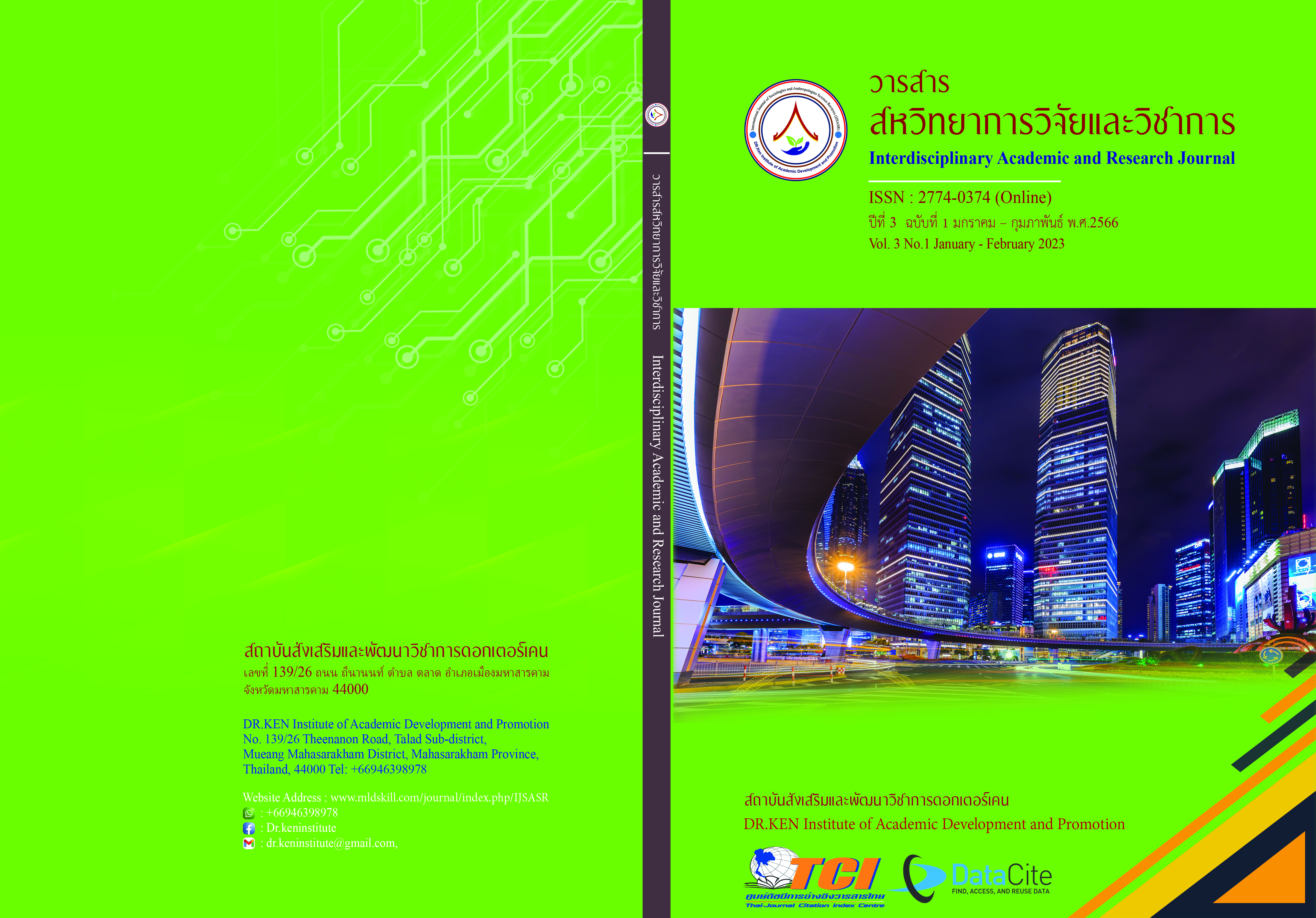Strategies of Driving Academic Works for Developing Innovative Thinking Skills by Project-based Learning of Students at Sam Roi Yot Witthayakhom School under the Prachuap Khiri Khan Secondary Educational Service Area Office
DOI:
https://doi.org/10.14456/iarj.2023.16Keywords:
Participation Strategy; , Project-based Learning; , Innovative Thinking SkillsAbstract
Innovative thinking skills are important skills in the 21st century. To develop students to have innovative thinking skills, teachers must encourage them to show their potential in the learning process. Therefore, the researcher was interested in conducting this research. The objectives of this research were to (1) study strategy for driving academic works to develop innovative thinking skills by using the project-based method, and (2) study the results of developing innovative thinking skills by using project-based learning management. The mixed method was used in this research. The population used in the research consisted of 85 students from Petch Ratchaphruek Project and 14 teachers from Sam Roi Yot Witthayakhom School under the Prachuap Khiri Khan Secondary Educational Service Area Office. The research tools were: 1) project-based learning plans, 2) students’ innovative thinking skills test, 3) students’ innovative thinking skills assessment form assessed by teachers, 4) strategy handbook for driving academic works to develop innovative thinking skills by using the project-based method, and 5) assessment form for using strategy handbook for driving academic works to develop innovative thinking skills by using the project-based method. The index of item-objective congruence (IOC) was between 0.67-1.00. The data were analyzed by using mean, standard deviation, and percentage of progress. The research result revealed that: (1) The strategy for driving academic works to develop innovative thinking skills of students by using a project-based method was participatory administration. And (2) The results of developing innovative thinking skills by using project-based learning management revealed that students had higher innovative thinking skills after learning than before learning with an average score increase of 9.48 points and progress of 47.41%.
References
กระทรวงศึกษาธิการ. (2546). คู่มือการบริหารสถานศึกษาขั้นพื้นฐานที่เป็นนิติบุคคล. กรุงเทพฯ : องค์การรับส่งสินค้าและพัสดุภัณฑ์.
กาญจนา บุญส่ง และคณะ. (2551). การพฒนาตัวบ่งชี้บทบาทความเป็นมหาวิทยาลัยเพื่อการพัฒนาท้องถิ่นของมหาวิทยาลัยราชภัฏเพชรบุรี. วารสารศกษาศาสตร์, 19 (2), 45-58.
คณะครุศาสตร์ จุฬาลงกรณ์มหาวิทยาลัย. (2551). การประชุมสัมมนาทางวิชาการและการนำเสนอผลงานวิจัย. กรุงเทพฯ : โรงพิมพ์จุฬาลงกรณ์มหาวิทยาลัย.
ชาญณรงค์ วิเศษสัตย์. (2562). การพัฒนารูปแบบการเรียนรู้ส่งเสริมทักษะการคิดเชิงนวัตกรรมของนักศึกษาวิชาชีพครู. วิทยานิพนธ์ปรัชญาดุษฎีบัณฑิต สาขาวิชาหลักสูตรและการสอน มหาวิทยาลัยมหาสารคาม.
ชุมศักดิ์ อินทร์รักษ์. (2545). การบริหารงานวิชาการ. ปัตตานี : ภาควิชาการบริหารการศึกษาคณะศึกษาศาสตร์ มหาวิทยาลัยสงขลานครินทร์ วิทยาเขตปัตตานี.
ดุษฎี โยเหลา และคณะ. (2557). การศึกษาการจัดการเรียนรู้แบบ PBL ที่ได้จากโครงการสร้างชุดความรู้เพื่อสร้างเสริมทักษะแห่งศตวรรษที่ 21 ของเด็กและเยาวชน: จากประสบการณ์ความสำเร็จของโรงเรียนไทย. กรุงเทพฯ : หจก.ทิพยวิสุทธิ์.
ธูปทอง กว้างสวาสดิ์. (2552). การสอนทักษะการคิด. มหาสารคาม : ภาควิชาหลักสูตรและการสอน คณะศึกษาศาสตร์มหาวิทยาลัยมหาสารคาม
ภูวสิษฏ์ บุญศร. (2561). การพัฒนากระบวนการการจัดการเรียนรู้โดยใช้โครงงานเป็นฐาน เพื่อส่งเสริมการคิดอย่างมีวิจารณญาณและการคิดแก้ปัญหาของโรงเรียนบ้านโป่ง เขตพื้นที่การศึกษาประถมศึกษาเชียงราย เขต 1. สำนักงานคณะกรรมการการศึกษาขั้นพื้นฐาน : กระทรวงศึกษาธิการ.
วิชัย วงษ์ใหญ่ และมารุต พัฒผล. (2562). การจัดการเรียนรู้ที่เสริมสร้างจิตนวัตกรรม. กรุงเทพฯ: ศูนย์ผู้นำนวัตกรรมหลักสูตรและการเรียนรู้ มหาวิทยาลัยศรีนครินทรวิโรฒ.
สิริอร วิชชาวุธ (2554). จิตวิทยาการเรียนรู้. กรุงเทพฯ : สำนักพิมพ์มหาวิทยาลัยธรรมศาสตร์.
สุรางค์ โค้วตระกูล. (2550). จิตวิทยาการศึกษา. พิมพ์ครั้งที่ 7. กรุงเทพฯ: จุฬาลงกรณ์มหาวิทยาลัย.
Australian National Training Authority. (2001). Australian National Training Authority (ANTA) agreement for 2001-2004. Brisbane, Queensland: ANTA. Retrieved from: http: //hdl.voced.edu.au/10707/163227.
Bellanca, J., & Brandt, R. (2010). 21st Century Skills: Rethinking How Students Learn. Bloomington, IN: Solution Tree.
Dalrymple, K. (2015). An Action Research Study Aimed at Designing and Implementing an Innovative Unit of Instruction Within the Context of Developing Innovative Thinking Skills Among Primary School Students. The University of the West Indies. Retrieved on 28 July 2021 from: http: //uwispace.sta.uwi.edu/dspace/bitstream/handle/2139/41190/Karen%20Dalrymple.pdf?sequence=1&isAllowed=y.
Drapeau, P. (2014). Sparking student creativity: Practical ways to promote innovative thinking and problem solving. Virginia USA: ASCD.
Lai, C. F., Hwang, R. H., Chen, S. Y., Huang, H. M. and T.T. Wu. (2015). Influence of Integrating Creative Thinking Teaching into Project-based Learning Courses to Engineering College Students. Retrieved on 5 July 2021 from: https: //www.sefi.be/wp-content/uploads/2017/09/56434-CHIN-FENG-LAI.pdf.
Lee, S. K. and Benza, R. (2015). Teaching Innovation Skills: Application of Design Thinking in a Graduate Marketing Course. Business Education Innovation. 7(1), 43-50.
Orlandi, A. E. C. (2010). Experimental experience in design education as a resource for innovative thinking: The case of Bruno Munari. Procedia-Social and Behavioral Sciences, 2 (2), 5039-504.
Pearlman, B., (2011). ทักษะแห่งอนาคตใหม่การศึกษาเพื่อศตวรรษที่ 21 [21st Century Skills Rethink How Students Learn] (วรพจน์ วงศ์กิจรุ่งเรือง และอธิป จิตตฤกษ์, แปล). กรุงเทพฯ: สำนักพิมพ์ Openworlds. (ต้นฉบับพิมพ์ปี ค.ศ. 2010). 197-205.
Downloads
Published
How to Cite
Issue
Section
License
Copyright (c) 2023 จิณณ์ณณัช ธาราจิรเศรษฐ์, อัญชนา พานิช

This work is licensed under a Creative Commons Attribution-NonCommercial-NoDerivatives 4.0 International License.
Copyright on any article in the Interdisciplinary Academic and Research Journal is retained by the author(s) under the under the Creative Commons Attribution-NonCommercial-NoDerivatives 4.0 International License. Permission to use text, content, images, etc. of publication. Any user to read, download, copy, distribute, print, search, or link to the full texts of articles, crawl them for indexing, pass them as data to software, or use them for any other lawful purpose. But do not use it for commercial use or with the intent to benefit any business.
















.png)


